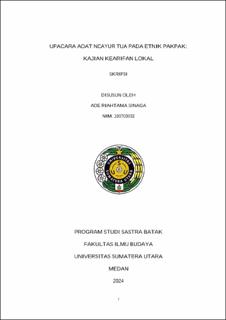| dc.description.abstract | In this research the author discusses the Pakpak Ethnic Old Ncayur Traditional Ceremony: A Study of Local Wisdom. This research aims to find out the stages of the Pakpak ethnic Ncayur Tua ceremony, what messages are contained in the Pakpak Ethnic Ncayur Tua Ceremony, as well as the value of local wisdom contained in the Pakpak Ethnic Ncayur Tua Traditional Ceremony. The meaning of the Pakpak ethnic Ncayur Tua ceremony is the death ceremony which is carried out when a person dies at an old age, is married, and all his children are married. The methods used in analyzing this research problem are qualitative methods and field research techniques. This research uses the theory of Local Wisdom put forward by Sibarani and Pragmatics put forward by Leech. The results of the research show that the stages contained in the Ncayur Tua traditional ceremony are: (1) tenggo raja (deliberation); (2) Puffing the Perdendang (musician who beats the drum); (3) Entering Bangke Mirumahna (putting the corpse in a coffin); (4) Tatak Ipas Ncayur Tua (dancing during the Ncayur Tua ceremony); (5) Mengkerboi (buffalo slaughter); and (6) Peberkatten Bangke Mi Pendebaen (departing the body to its final resting place). Apart from that, the speech functions contained in the Ncayur Tua Pakpak Ethnic traditional ceremony are: (1) expressive function; (2) directive function; (3) commissive function; (4) representative function; and (5) declarative function. The local wisdom values contained in the Pakpak ethnic Old Ncayur Ceremony include: (a) Peace, consisting of (1) Politeness (2) Honesty, (3) Social solidarity, (4) commitment (b), welfare consisting of: (1) hard work, (2) discipline, and (3) mutual cooperation, (4) gender management, and (5) cultural preservation and creativity. | en_US |


